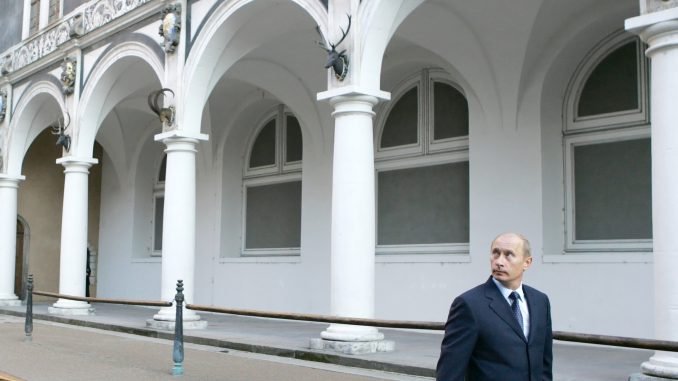
Putin’s party paid for by oil money (I)
Flood of easy oil dollars
Putin modified the Soviet raw exports system so that the revenue, which used to be directed at the military-industrial complex, started flowing into the pockets of the privileged few. According to reliable sources, he did not do it at his own peril and is now one of the richest men on Earth. Due to soaring cash flows, there was enough money for both prestige projects like the Sochi Olympics and for pandering to the voters with bigger pensions and salaries.
Making the country richer did not require much effort – the development of major oil and gas fields started back under the Soviets. As the money started pouring in, there was little incentive to build something new, everything could be bought from the West.
Incredible and effortless riches, in turn, inspired delusions of grandeur about directing the world order. When oil prices hit the USD 147 record in July 2008 and the word was that it could go higher, Moscow had finally the guts to show off its power against a small neighbouring country that decided to move westwards. On 8 August 2008, Russia attacked Georgia.
Western clemency – for the sake of its business interests and the status quo – assured Putin that he could dictate his rules and they will be accepted. After attacking Ukraine, however, the reaction changed. It might not have been as forceful as many of us would like, but it was united. Extension of the sanctions is a proof that, despite Russia’s effort, it could not find a single member state willing to use its veto power for Moscow’s sake.
Sad consequences
Stagnating economy in Russia is a direct consequences of Putin’s 15-year reign. The slowdown began several years ago, but at first only economists could see it in summary reports. Their warnings were no better than those aboard the Titanic who saw the approaching iceberg. Inertia was too big and mistakes made reached back to design flaws.
Instead of tackling stagnation with foreign investment and global financial markets, Putin took a grab in Ukraine, distracting the Russian people with a struggle against imagined fascism. Today, most Russians still prioritize their TV sets, but as their fridges become emptier, this appliance will take on greater importance.
Signs of the economic slowdown were compounded by a drop in global oil prices. The rouble lost half of its value against the US dollar. Today, Russians who want to visit Lithuania need twice as many roubles to buy as many euros as before; meanwhile their nominal wages have not risen.
The effect of the Western sanctions on Russia’s economy is comparable to a dose of poison. Nothing seems to be happening at first, while the bloodstream moves it around the body. Signs on the skin do not appear before internal organs are covered with severe, albeit externally imperceptible wounds. Capital flight, refused investment and internal fights among power clans will inevitably result in depressed quality of life of every Russian.
In March, General Motors announced it was closing down its Opel and Chevrolet plants in Russia. The decision will cost the companies a lot of money, but leaving still seems less damaging than staying. Meanwhile Russia will lose 1,500 jobs and gain as many unemployed workers to whom it has little to offer except war show in the Donbass.
Lithuania and its allies are discussing how to tackle possible aggression, Lithuanian voters are pinning their hopes on newly-elected mayors and city councils. Meanwhile Russia is attacking its neighbours, intimidating everyone else, while most Russians keep silent as opposition leader Boris Nemtsov, gunned down by the walls of the Kremlin, is laid to rest. This is how far Putin has taken Russia from Europe.

Be the first to comment